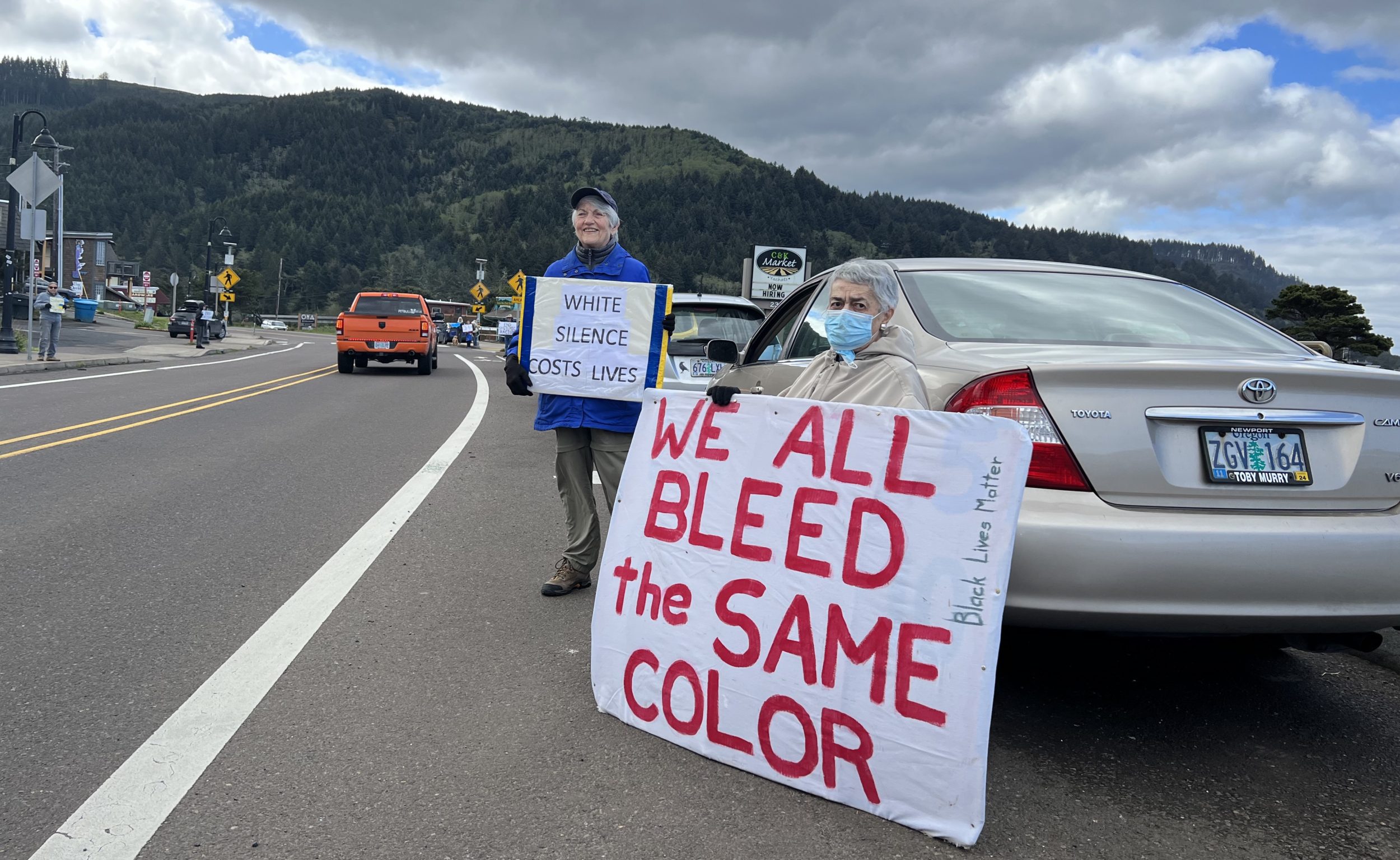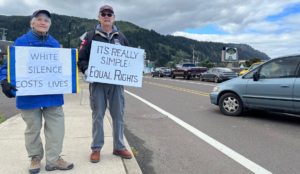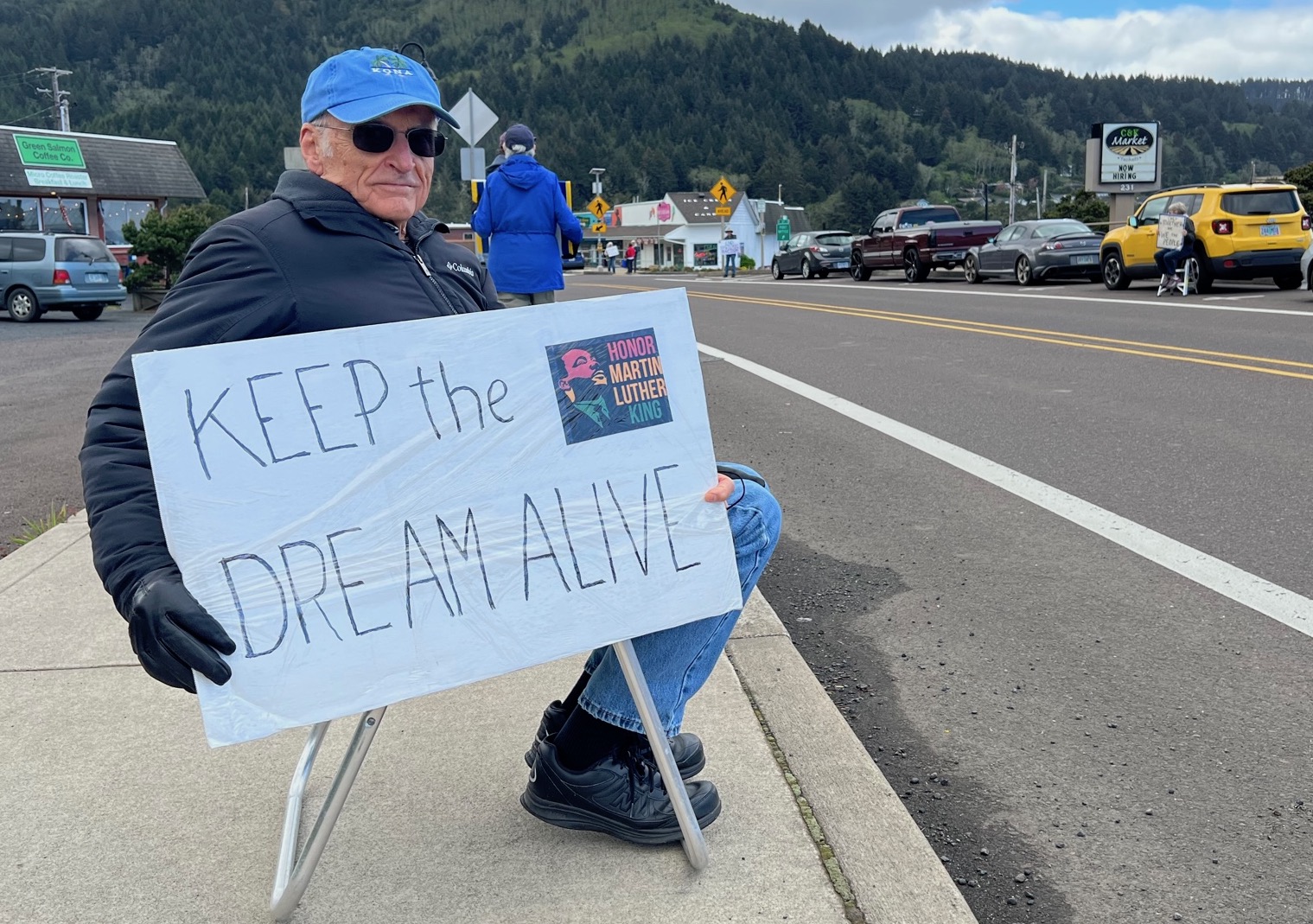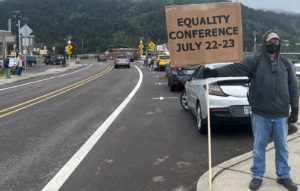
By QUINTON SMITH/YachatsNews
YACHATS – They’ve endured the wind, the rain, the hail and the near-freezing temperatures. They’ve heard the horn honks and seen the thumbs up – and the middle finger wave.
This Saturday, an intrepid band of Yachats residents will note a special milestone – an hour every Saturday morning for three years standing along U.S. Highway 101 in downtown Yachats to show anyone who passes by that racism should not be tolerated.
The demonstration started spontaneously on May 30, 2020, following the killing of George Floyd, an African American, by police in Minneapolis. It has continued for an hour beginning at 10 a.m. each Saturday since. That’s 157 Saturdays.
The low-key event – people simply holding signs along the highway — appears to be the longest-running group protest in Oregon and likely the Northwest.

The lowest number of participants was nine “during the middle of a hail storm,” said Jonni Prince, who with her husband Dave Cowden have been there on every Saturday but one – to attend the wedding of a son in Kansas City. The largest number of participants was 72.
The group has no leaders. But Mary Deriberprey, a longtime Yachats resident of Puerto Rican descent, who joined the demonstration during its first year, may be its inspiration.
“I have to be sick to miss it,” says the 80-year-old Deriberprey. “It’s very important for me to do. For some of us this is very personal, not political.”
After its first year some regulars began having doubts about the value of continuing the demonstrations. So they met to discuss it.
“We really struggled,” Prince says now. “We didn’t want it to be considered a performance. But we had to ask ourselves ‘Are we being helpful?’ ”
Prince said Deriberprey – whose family, including son John, has struggled with racism in the community — answered that question by saying the Saturday event helped her “feel safe.”
“That’s all we needed to hear,” Prince says.
And so they continue to show up. Every Saturday. 10 o’clock. Rain or shine. Three years without a miss.

Individual motivations
Myron Eckhardt, 87, is one of the longest-participating demonstrators. Like Deriberprey, showing up every Saturday is personal.
Eckhardt and his wife adopted an African American boy as their third child and said their inter-racial family experience in New York and southern California was “very positive.” But more recently his son and his family moved to Europe after experiencing persistent racism from some neighbors in Encino, Calif.
“I would be very disappointed in myself if I didn’t make it on a Saturday morning,” Eckhardt said. “It’s something I’m committed to.”

Toni Trauman and Ann Fisler moved to Yachats three months after George Floyd’s murder and started attending the Saturday demonstrations a year later.
“We’re committed to it,” Trauman said. “We see so many forms of discrimination in our society. We also have been in that situation. It’s widespread. The one hour on Saturday’s may be something little, but it’s something we decided to do.”
Mike LaBare moved to Yachats in August 2020 and joined the demonstration three months later. But he’s not new to protesting. The 63-year-old retired electrical engineer regularly participates in Portland protests and was involved in an anti-racist demonstration last year in Salem where he was pepper sprayed by bikers providing security for a right-wing group.
“I’m used to doing a lot of demonstrating,” he said. “There is systemic racism. There is no doubt about it. And, I have the wherewithal to try to do something about it.”
Developing July conference
There’s still a bit of debate among demonstrators if their weekly protests do any good.
Prince, Cowden, Deriberprey, Eckhardt and Trauman believe it does.
“We all know that Yachats leans liberal,” said Prince. “But I also think it says Yachats is a town with a conscience and that we care about our neighbors.”

LaBare is more direct about his doubts.
“It might make someone think a little bit, but to enact change? No,” he said. “I’m not fooling myself. This is performative.”
Trauman believes the effect is individual. She hands flyers to people who walk by and believes drivers passing through see the demonstrators and think – if only for a minute – about racism.
“We all figure it can’t do any harm,” she said. “How can you sit by and not do something?”
But the Saturday demonstrators — including LaBare — have also hit upon something they hope can further the community’s discussion of race. A core group is organizing a conference for racial equality and understanding July 22-23 featuring African-American, Native American, Latino speakers and performers on racial issues.
“The idea came from conversations we were having,” said Prince. “It grew out of this group. We have no idea how it’s going to be perceived, but it’s opening the door to a conversation.
“But I think that we’re a community that speaks out when we seen an injustice,” she said.
- Quinton Smith is the editor of YachatsNews.com and can be reached at YachatsNews@gmail.com



Once again, do you need the fame? I was just wondering if you could spend that time, writing letters to your elected officials. Please forgive me but it feels like it’s more about you than your message.
Respectfully, the age old criticism of those you accuse of doing too little and the criticism of doing too much are just justification for doing nothing.
Thank you Yachats community for being out there every Saturday and all the rest you do in the struggle against racism so we can have better world.
Lisa Roellig
Yachats
Well Said Lisa 👏
Who says they’re not doing both? I know many of those involved who are demonstrating, writing letters, making phone calls, working at the Yachats Food Pantry, working at Don’s Place, serving on various boards and commission If anything is ever going to change, it will take a concerted effort on many fronts.